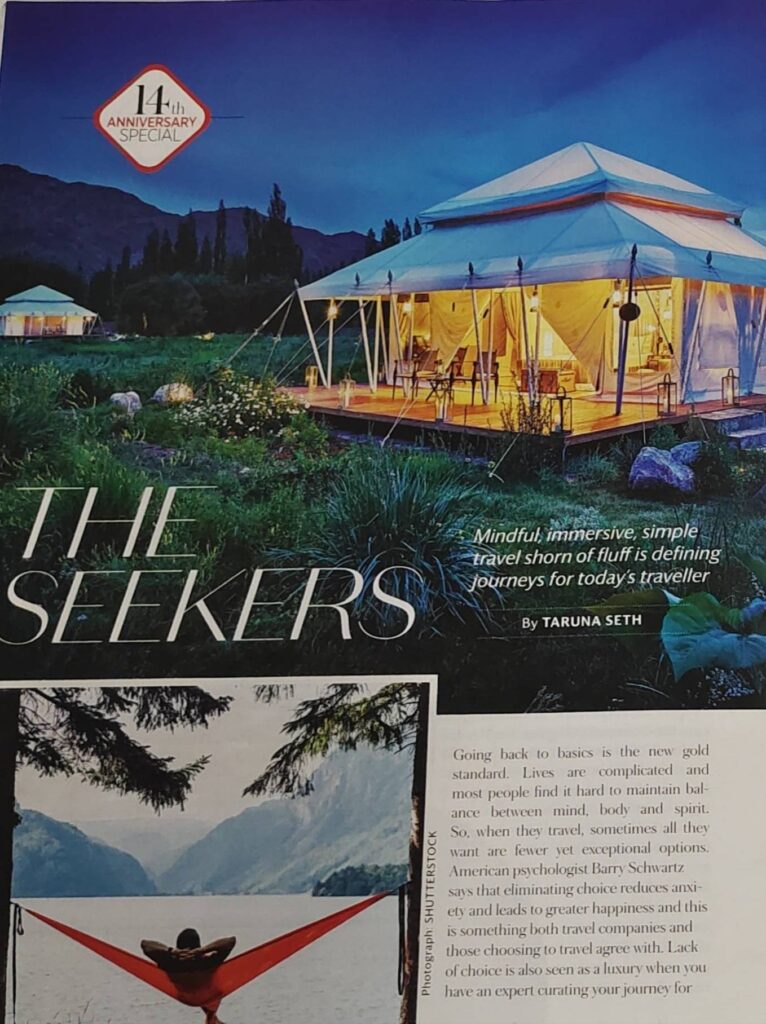The seekers
Going back to basics is the new gold standard. Lives are complicated and most people find it hard to maintain balance between mind, body and spirit. So, when they travel, sometimes all they want are fewer yet exceptional options. American psychologist Barry Schwartz says that eliminating choice reduces anxiety and leads to greater happiness and this is something both travel companies and those choosing to travel agree with.
Lack of choice is also seen as a luxury when you have an expert curating your journey for you. This desire to pare down is underlined by a fight-or-flight instinct to escape over stimulation and eventual burnout. Traditionally, luxury has been associated with excess but no longer so. Luxury is not simply about being presented with an easier decision at dinner; the options made available must also be exceptional.
What high-end consumers seek today is a streamlined experience carefully curated by experts, so they can relax in the knowledge that an intelligent, informed decision has been made on their behalf. This is also true of honeymooners in their 30s. Our clients covet authentic experiences, be it be diving in the great blue hole in Belize, chasing the Northern Lights in Norway or navigating through the best that Japan has to offer.
Overwhelming choice and accessibility facilitated by the internet may, conversely, be one reason that we are seeing a return to doing things through a travel advisor, even among millennials. In the era of hyper-connectivity with Google map just a tap away, we have become reliant on technology for virtually everything. Travellers seem to have lost their way.
We may seem connected on a global scale, but locally, we are isolated. Not only do we lack survival skills (start a fire, fend for food, navigate) but have also become disconnected from the natural world and ourselves. After years of being cocooned in comfortable homes and luxurious hotels rooms, we seek real connections. Travellers are looking for experiences that dare to challenge them both physically and mentally. They might still be pampered, pre, post, or even during their trip, but they want their holiday to be a learning experience; something that brings them a sense of accomplishment and self-worth.
Getting back to basics is not just about reconnecting with nature but also about realising that travellers can learn a lot from other cultures that have maintained a simpler way of life. This does not imply you have to be stranded on an island, or brave polar conditions for a weekthe experiences can also be bite-sized reality checks realised through culturally immersive activities.
Of late, we have seen more people trekking to Machu Picchu following the Inca trail than living it up in the French Riviera. Many of our discerning guests, for instance, have expressed their desire to spend a day with the monks in Bhutan and go on a meditative inward journey. Others are keen to get more fundamentally involved in the place they visit. For example, some of our guests recently interacted with Sonam Wangchuk, a world-renowned innovator and education reformist based in Ladakh, Kashmir.
A truly great way to be inspired and forge a deeper connection with a place being visited. It is almost as if these new age travellers want to get rid of the clutter. Consider the KonMari method of organising and simplifying your homes and spaces that has taken the world by storm. It consists of gathering together all of one’s belongings and then keeping only those things that spark joy. Travel, going forward, will be just that; simple yet immersive and authentic. Simplicity in experiential travel is here to stay.

